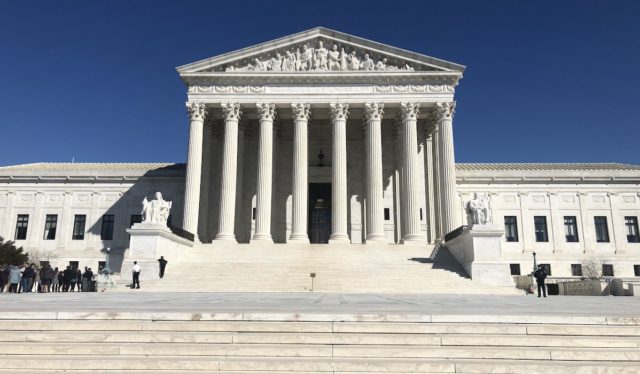

The U.S. Supreme Court this afternoon agreed to hear a case brought by the State of Oklahoma challenging the court’s 2020 decision in McGirt v. Oklahoma, but it will not consider overturning the decision entirely.
In its petition in Oklahoma v. Castro-Huerta, the state asked the court to address two questions:
- Whether a State has authority to prosecute non-Indians who commit crimes against Indians in Indian country.
- Whether McGirt v. Oklahoma (…) should be overruled.
The court’s order today specifies that it will consider only Question 1 of the petition, with oral arguments scheduled for April.
Although repeal of the landmark July 2020 SCOTUS decision is not on the horizon as his administration had hoped, Oklahoma Gov. Kevin Stitt applauded the court’s announcement.
“I am encouraged that the Supreme Court has decided to address whether a state has authority to prosecute non-Indians who commit crimes against Indians in Indian Country,” Stitt said in a press release. “The fallout of the McGirt decision has been destructive. Criminals have used this decision to commit crimes without punishment. Victims of crime, especially Native victims, have suffered by being forced to relive their worst nightmare in a second trial or having justice elude them completely.”
Cherokee Nation Principal Chief Chuck Hoskin Jr. also called the court’s announcement as a victory.
“The Cherokee Nation celebrates the Supreme Court’s rejection of a blatantly political request to overturn its McGirt decision,” he said in a statement Friday afternoon.
Choctaw Nation Chief Gary Batton also released a statement.
“While the Supreme Court plans to address some of the effects of McGirt, today’s decision correctly recognizes both settled law and tribal sovereignty,” Batton said. “We thank the justices for clearly establishing their ruling in McGirt will not be reconsidered at this time. As a nation, we will continue doing everything we can to protect our citizens and our neighbors.
“We hope Oklahoma’s government officials will now turn their attention to cooperation, rather than conflict.”
Background on the case
Oklahoma v. Castro-Huerta is one of dozens of cases challenging the McGirt ruling that the state has appealed to the Supreme Court recently, but its far-reaching request for a full overturn has made it central to the state’s efforts roll back the consequences of the court’s 2020 decision.
The case itself centers on Victor Manuel Castro-Huerta, a non-tribal citizen who had been sentenced to 35 years in prison for child neglect in a case where the child was a citizen of the Cherokee Nation. His sentence was vacated by the Oklahoma Court of Criminal Appeals, which found that, based on McGirt, the state did not have jurisdiction to prosecute Castro-Huerta.
Stitt’s press release Friday afternoon pointed the the case as an example of what he described as a critical legal failure brought about by McGirt.
“The reality is that the McGirt decision has hamstrung law enforcement in half of the state,” he said. “Oklahoma is a law and order state, and I was elected to protect all four million Oklahomans, regardless of their race or heritage. I will not stop fighting to ensure we have one set of rules to guarantee justice and equal protection under the law for all citizens.”
In an amicus brief filed in Oklahoma v. Castro-Huerta, the Muscogee Nation challenged Stitt’s representation of the post-McGirt legal landscape.
“The United States, the Nation, and local officials are successfully collaborating to ensure that there is no crisis of criminal justice on the Reservation. Oklahoma cannot conjure one by ignoring their efforts,” the brief states. “The Oklahoma Court of Criminal Appeals (“OCCA”) has narrowed the universe of cognizable McGirt-based conviction challenges to those raised on direct appeal. The United States and the Nation are re-prosecuting where such challenges succeed—including in this case, where the respondent has already been reconvicted in federal court—and are devoting substantial resources to the investigation and prosecution of new crimes.”
Earlier this month, the Supreme Court declined to hear cases questioning whether McGirt could be applied retroactively to cases that had received a final verdict, leaving in place a Court of Criminal Appeals ruling that disallows retroactive application.
The court’s latest list of orders, released Wednesday, denied hearings to two McGirt-related cases, but a number of others are still awaiting consideration.
(Update: This article was updated at 5:55 p.m. Friday, Jan. 21, to include a quote from Gary Batton and to adjust the headline.)




















